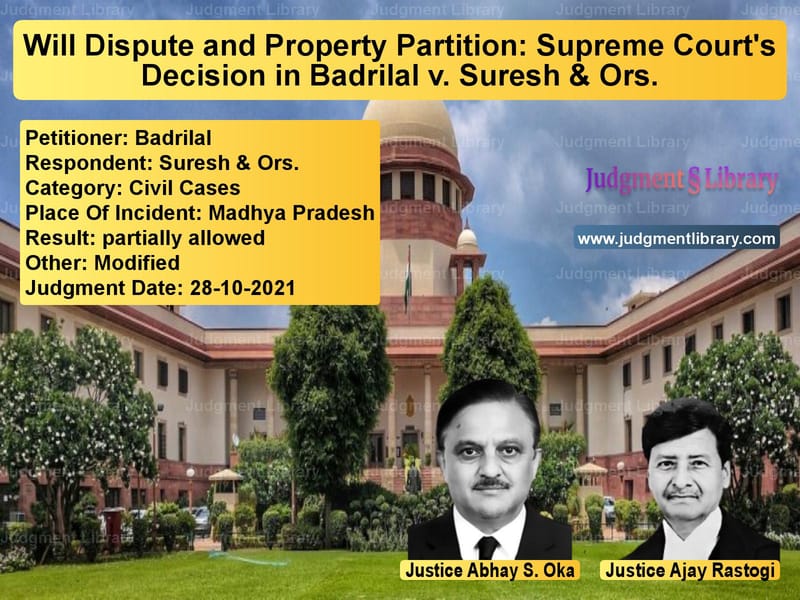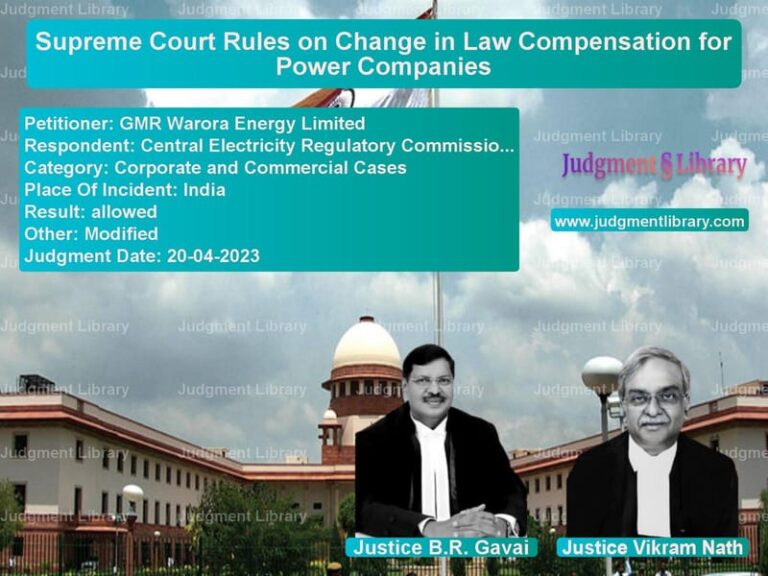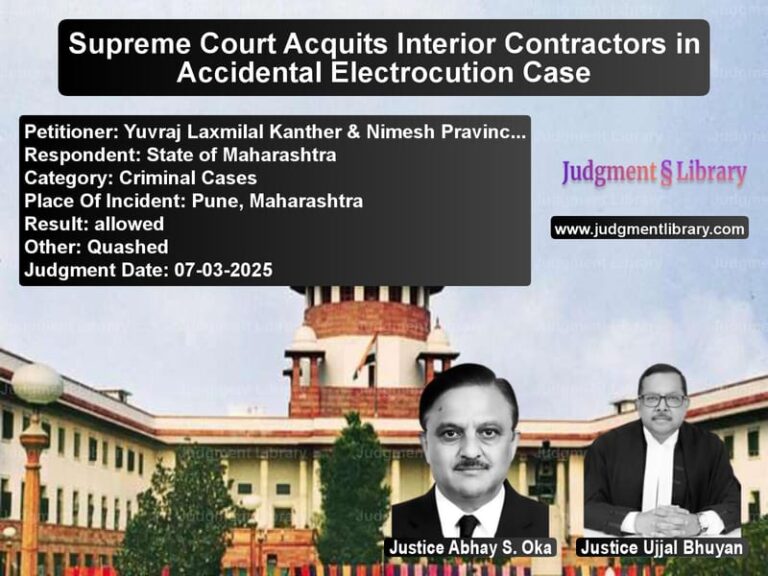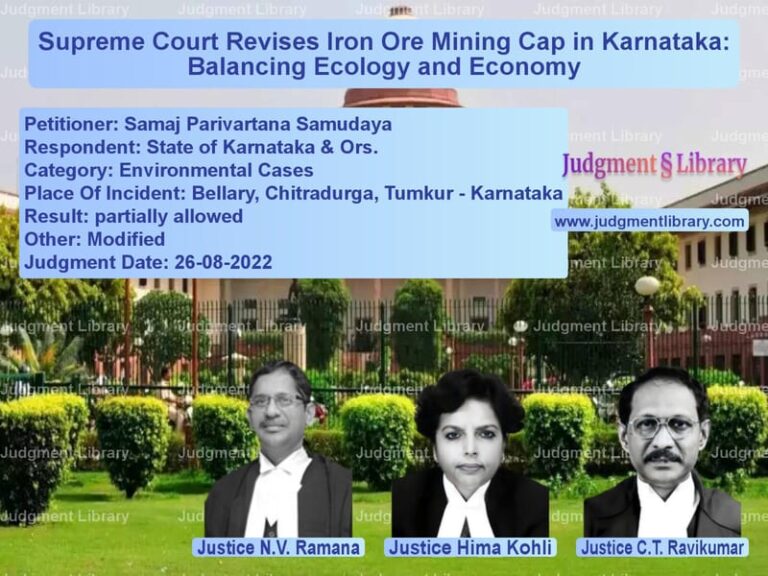Will Dispute and Property Partition: Supreme Court’s Decision in Badrilal v. Suresh & Ors.
The Supreme Court of India recently ruled on a significant property dispute involving a will, inheritance, and a contested sale deed in Badrilal v. Suresh & Ors. The judgment, delivered on October 28, 2021, revolved around the validity of a will executed by the deceased, the legality of a subsequent agreement altering inheritance claims, and the rightful ownership of land sold by one of the heirs.
Background of the Case
The dispute involved a piece of land in Madhya Pradesh that was originally owned by Mangilal. He had two close family branches: his daughter, Ramkanya, and his nephews, Suresh, Dilip, and Prakash (sons of his brother Bhuwan Ji). Before his death on June 26, 2009, Mangilal executed a will on May 6, 2009, distributing his property among his daughter and nephews.
According to the will:
- Ramkanya was to receive 3 Bigha and 10 Biswa of land.
- Suresh, Dilip, and Prakash were to receive 1 Bigha each.
However, before Mangilal’s death, on May 12, 2009, an agreement was made between Suresh and Ramkanya that revised the distribution:
- Ramkanya would receive 5 Bigha of land.
- Suresh would receive 2 Bigha and 3 Biswa.
Later, on February 21, 2011, Ramkanya executed a sale deed selling the entire land to Badrilal, the appellant in this case. Suresh challenged this sale, leading to a legal battle over the ownership and validity of the transactions.
Legal Issues Examined
- Whether the will dated May 6, 2009, was legally valid and enforceable.
- Whether the agreement dated May 12, 2009, could revoke the will.
- Whether the sale deed executed by Ramkanya in favor of Badrilal was valid.
- Whether the property required partition before it could be legally sold.
Arguments Presented
Petitioner’s (Badrilal) Arguments
The appellant, Badrilal, contended that:
- The will had been revoked by the agreement dated May 12, 2009, which also bore Mangilal’s thumb impression.
- As Mangilal’s only daughter, Ramkanya was the sole legal heir and could dispose of the entire property.
- The sale deed executed in his favor on February 21, 2011, was valid.
- The trial and appellate courts had wrongly ruled against him.
Respondent’s (Suresh) Arguments
Suresh, the original plaintiff, countered by arguing that:
- The will was never revoked in accordance with legal procedures.
- The agreement of May 12, 2009, was not a legally recognized revocation.
- Ramkanya could not sell the entire land as the property had not been partitioned.
- The sale deed was void regarding his ownership portion.
Supreme Court’s Analysis
Validity of the Will
The Court examined the will and the testimonies of two attesting witnesses, ruling:
“The will dated 6th May 2009 was duly executed by Mangilal and has not been revoked as per the law.”
Revocation of the Will
The Court noted that under Section 70 of the Indian Succession Act, 1925, a will can only be revoked:
- By executing a new will or codicil.
- Through a written declaration with the same execution formalities as a will.
- By destruction of the will by the testator or someone authorized by them.
The Court ruled:
“The agreement dated 12th May 2009 does not meet the legal requirements for revoking a will. Mangilal’s thumb impression alone is insufficient.”
Validity of the Sale Deed
Since the will was held valid, Ramkanya had only an undivided share of the property. The Court ruled:
“Ramkanya could not sell the entire property without a partition. The sale deed is valid only to the extent of her share.”
Final Judgment
The Supreme Court upheld the decisions of the lower courts with some modifications:
- The will dated May 6, 2009, is valid and enforceable.
- The agreement dated May 12, 2009, did not revoke the will.
- The sale deed executed by Ramkanya is valid only to the extent of her share (3 Bigha and 10 Biswa).
- The remaining portion of the property is not affected by the sale and remains with Suresh and his brothers.
- Partition must be conducted before further transactions occur.
Significance of the Judgment
This ruling has significant legal implications:
- Reaffirms the principle that wills must be revoked according to strict legal procedures.
- Clarifies that an heir cannot sell undivided property without partition.
- Protects rightful heirs from unauthorized property sales.
- Establishes that agreements made before a testator’s death do not override a legally executed will.
The Supreme Court’s decision upholds the sanctity of wills and ensures that property inheritance follows the due process of law, preventing unlawful claims and sales.
Petitioner Name: Badrilal.Respondent Name: Suresh & Ors..Judgment By: Justice Abhay S. Oka, Justice Ajay Rastogi.Place Of Incident: Madhya Pradesh.Judgment Date: 28-10-2021.
Don’t miss out on the full details! Download the complete judgment in PDF format below and gain valuable insights instantly!
Download Judgment: badrilal-vs-suresh-&-ors.-supreme-court-of-india-judgment-dated-28-10-2021.pdf
Directly Download Judgment: Directly download this Judgment
See all petitions in Succession and Wills
See all petitions in Property Disputes
See all petitions in Specific Performance
See all petitions in Judgment by Abhay S. Oka
See all petitions in Judgment by Ajay Rastogi
See all petitions in partially allowed
See all petitions in Modified
See all petitions in supreme court of India judgments October 2021
See all petitions in 2021 judgments
See all posts in Civil Cases Category
See all allowed petitions in Civil Cases Category
See all Dismissed petitions in Civil Cases Category
See all partially allowed petitions in Civil Cases Category







